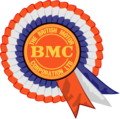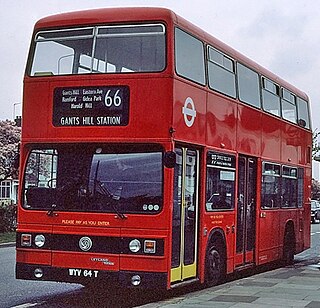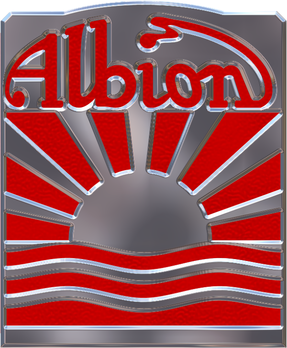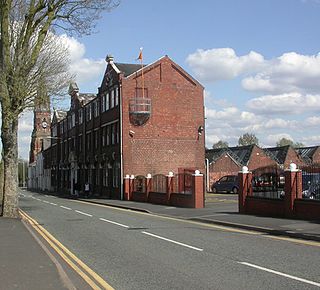Related Research Articles

The British Motor Corporation Limited (BMC) was a UK-based vehicle manufacturer, formed in early 1952 to give effect to an agreed merger of the Morris and Austin businesses.

Leyland Motors Limited was a British vehicle manufacturer of lorries, buses and trolleybuses. The company diversified into car manufacturing with its acquisitions of Triumph and Rover in 1960 and 1967, respectively. It gave its name to the British Leyland Motor Corporation, formed when it merged with British Motor Holdings in 1968, to become British Leyland after being nationalised. British Leyland later changed its name to simply BL, then in 1986 to Rover Group.

Associated Equipment Company (AEC) was a British vehicle manufacturer that built buses, motorcoaches and trucks from 1912 until 1979. The name Associated Equipment Company was hardly ever used; instead it traded under the AEC and ACLO brands.

The Leyland Titan is a rear-engined double-decker bus manufactured by Leyland between 1977 and 1984, primarily for London Transport.

Thornycroft was an English vehicle manufacturer which built coaches, buses, and trucks from 1896 until 1977.

Albion Motors was a Scottish automobile and commercial vehicle manufacturer.
Leyland Trucks is a medium- and heavy-duty truck manufacturer based in Leyland, Lancashire, United Kingdom. It can trace its origins back to the original Leyland Motors, which was founded in 1896, and subsequently evolved into British Leyland. After British Leyland became the Rover Group in 1986, the truck business was spun off and merged with DAF Trucks to form DAF NV, operating as Leyland DAF in the UK.

Park Royal Vehicles was one of Britain's leading coachbuilders and bus manufacturers, based at Park Royal, Abbey Road, in west London. With origins dating back to 1889, the company also had a Leeds-based subsidiary, Charles H. Roe.

The East Kent Road Car Company Ltd is a bus company formed in 1916 and based in Canterbury, Kent. The company operated bus and coach services in Kent. In 1993 it was one of the first companies to be acquired by the Stagecoach Group, which eventually rebranded the operation as Stagecoach in East Kent, and made it part of the Stagecoach South East bus division.

Southdown Motors Services Ltd was a bus and coach operator in East and West Sussex and parts of Hampshire, in southern England. It was formed in 1915 and had various owners throughout its history, being purchased by the National Bus Company (NBC) in 1969. The company fleet name was lost when it was acquired by the Stagecoach Group in 1989 but buses operated under that legal name until 2015 when the operating licence was transferred to another company within the Stagecoach Group and 1915 company became dormant but still owned by the Stagecoach Group.

Charles H Roe was a Yorkshire coachbuilding company. It was for most of its life based at Crossgates Carriage Works, in Leeds.

Samuel Ledgard (1874–1952) was a Leeds entrepreneur who became a major West Yorkshire Independent bus operator. Following his death in 1952, his executors continued to operate the Samuel Ledgard bus company until 1967, when it was acquired by the West Yorkshire Road Car Company.

The Daimler Fleetline is a rear-engined double-decker bus chassis which was built between 1960 and 1983.

Ribble Motor Services was a large regional bus operator in North West England based in Preston.

The Maudslay Motor Company was a British vehicle maker based in Coventry. It was founded in 1902 and continued until 1948 when it was taken over by the Associated Equipment Company (AEC) and along with Crossley Motors the new group was renamed Associated Commercial Vehicles (ACV) Ltd.

The Leyland Panther was a rear-engined single-decker bus chassis manufactured by Leyland between the years 1964 and 1972. A version with a smaller engine was released as the Leyland Panther Cub.

The Doncaster trolleybus system once served the town of Doncaster, South Yorkshire, England. Opened on 22 August 1928, it gradually replaced the Doncaster Corporation Tramways. By the standards of the various now-defunct trolleybus systems in the United Kingdom, the Doncaster system was a moderately sized one, with a total of 6 routes, all radiating out from the town centre, and a maximum fleet of 47 trolleybuses. The Bentley route was the first to close, on 12 February 1956, and the Beckett Road route was the last to go, on 14 December 1963.
The Leyland Royal Tiger PSU was an underfloor-engined bus and coach chassis manufactured by Leyland between 1950 and 1954.

Sunbeam Commercial Vehicles was a commercial vehicle manufacturing offshoot of the Wolverhampton based Sunbeam Motor Car Company when it was a subsidiary of S T D Motors Limited. Sunbeam had always made ambulances on modified Sunbeam car chassis. S T D Motors chose to enter the large commercial vehicle market in the late 1920s, and once established they made petrol and diesel buses and electrically powered trolleybuses and milk floats. Commercial Vehicles became a separate department of Sunbeam in 1931.
Wadham Stringer was an English ambulance and bus manufacturer.
References
- ↑ AEC Group to be Reorganised Commercial Motor 10 September 1948
- ↑ Park Royal Stock Exchange Commercial Motor 29 April 1949
- ↑ Leyland-ACV Merger Approved Commercial Motor 24 August 1962
- ↑ Companion to Road Passenger Transport History. Walsall: Roads & Road Transport History Association. 2013. p. 32. ISBN 9780955287633.